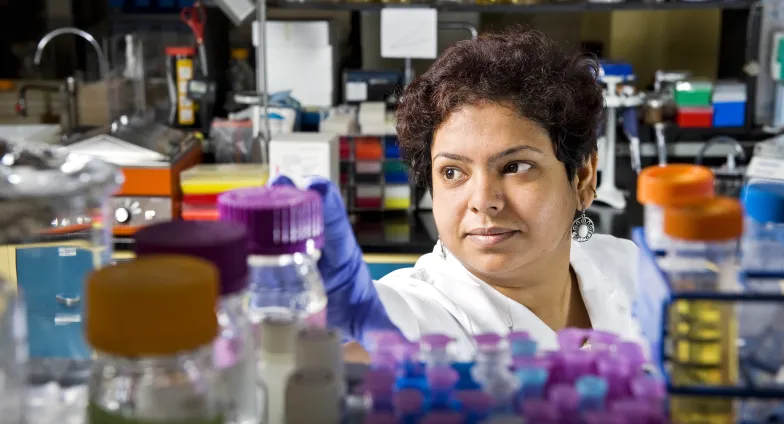Graduate Programs in Microbiology
Master of Science in Microbiology
The Master of Science in Microbiology program emphasizes research methodology and laboratory techniques. Student research and academic programs support a strong foundation of knowledge in microbiology and are individually tailored to meet the needs and interests of each student. Graduates are prepared for positions in research or commercial laboratories or for further graduate study. Students select a major adviser by the end of the first semester in residence. By the end of the first year in residence, the student and major adviser will select a supervisory committee. Students can earn a Master of Science in Microbiology by completing a research thesis under the advisement of a research faculty member or by completing a comprehensive research paper in the program.
Graduating comprehensive master's students will be able to:
- Adhere to ethical and professional standards in Microbiology.
- Demonstrate foundational knowledge in Microbiology.
- Participates in scholarly inquiry relevant the field of study.
- Critically analyze and write quality technical documents and communicate scientific content to a chosen audience.
- Participates in collaboration to successfully complete a project.
- Display professional skills in personal effectiveness, including managing individual projects and being ready for the workplace.
Graduating thesis master's students will be able to:
- Adhere to ethical and professional standards in Microbiology.
- Demonstrate foundational knowledge in Microbiology.
- Participates in scholarly inquiry relevant the field of study.
- Collect and document reproducible and publishable quality data through completion of experiments using at least one technique.
- Critically analyze, write high-quality technical documents, and communicate scientific content to a chosen audience. Contribute significantly (co-authorship) to scientific journal articles.
- Participates in collaboration in ways that enhance the output of the project.
- Display professional skills in personal effectiveness, including managing individual projects and being ready for the workplace.
- Participate in activities that promote civic responsibility, citizenship, and inclusiveness.
Ph.D in Microbiology
The program for a Doctorate in Microbiology encompasses many sub-disciplines, including:
- Plant-microbe and animal-microbe interactions
- Microbiome research
- Virology
- Vaccine development
- Soil microbiology
- Biofilm research
- Immunology
- Discipline-based education research
The program trains students in the foundation of knowledge, process of inquiry, and philosophy of microbiology. It breaks with traditional programs by focusing training on seven well-defined learning outcomes that can be attained with or without supporting coursework. This includes outcomes for professional, ethical, and civic development. Graduates are prepared for a variety of career paths including academic or industry research and academic teaching.
Graduating doctorate students will be able to:
- Demonstrate professional and ethical behavior consistent with the expectations of the discipline (Graduate School outcome 6)
- Use and apply appropriate discipline knowledge, concepts, and theoretical frameworks. (Graduate School outcomes 1, 2, 4, and 5)
- Conduct scholarly inquiry relevant to societal challenges and the field of study (Graduate School outcomes 1, 2, and 5)
- Demonstrate proficiency with a variety of classical and modern techniques by collecting and documenting reproducible and publish quality data through completion of experiments. (Graduate School outcomes 4 and 7)
- Critically analyze, write high-quality technical documents, and communicate scientific content and research results to different audiences. Contribute significantly (first-authorship) to scientific journal articles. (Graduate School outcome 3)
- Initiate and manage collaboration in ways that enhance the output of the project.
- Display professional skills in personal effectiveness to be competitive in the job market (Graduate School outcome 7)
- Engage and initiate activities that display civic responsibility, citizenship and inclusiveness.
The program of study is customizable to each student’s training needs. In the absence of course requirements, the program holds students accountable for year-over-year progress toward the learning goals by annual assessments of student progress, which are conducted by the mentor and research advisory committee.
